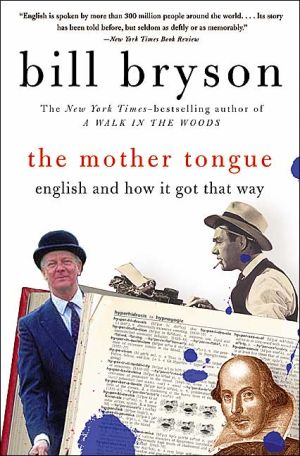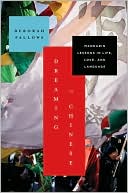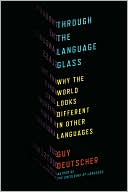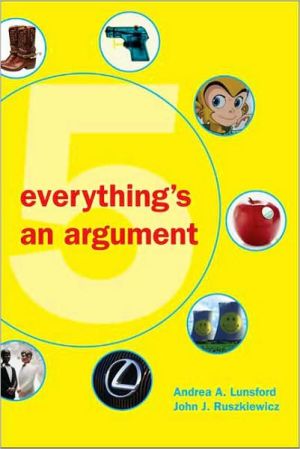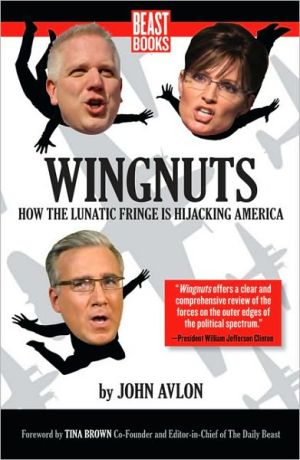Mother Tongue: English and How It Got That Way
With dazzling wit and astonishing insight, Bill Bryson—the acclaimed author of The Lost Continent—brilliantly explores the remarkable history, eccentricities, resilience and sheer fun of the English language. From the first descent of the larynx into the throat (why you can talk but your dog can't), to the fine lost art of swearing, Bryson tells the fascinating, often uproarious story of an inadequate, second-rate tongue of peasants that developed into one of the world's largest growth...
Search in google:
With dazzling wit and astonishing insight, Bill Bryson—the acclaimed author of The Lost Continent—brilliantly explores the remarkable history, eccentricities, resilience and sheer fun of the English language. From the first descent of the larynx into the throat (why you can talk but your dog can't), to the fine lost art of swearing, Bryson tells the fascinating, often uproarious story of an inadequate, second-rate tongue of peasants that developed into one of the world's largest growth industries. Burt Hochburg Complex and maddeningly illogical though it is, English is spoken by more than 300 million people around the world...Its story has been told before, but seldom as deftly or as memorably...An enthralling excursion...A motherlode of delectable trivia. —The New York Times Book Review
Chapter One\ THEWORLDS LANGUAGE\ More than 300 million people in the world speak English and the rest, it sometimes seems, try to. It would be charitable to say that the results are sometimes mixed.\ Consider this hearty announcement in a Yugoslavian hotel: "The flattening of underwear with pleasure is the job of the chambermaid. Turn to her straightaway." Or this warning to motorists in Tokyo: "When a passenger of the foot heave in sight, tootle the horn. Trumpet at him melodiously at first, but if he still obstacles your passage, then tootle him with vigor." Or these instructions gracing a packet of convenience food from Italy: "Besmear a backing pan, previously buttered with a good tomato sauce, and, after, dispose the cannelloni, lightly distanced between them in a only couch."\ Clearly the writer of that message was not about to let a little ignorance of English stand in the way of a good meal. In fact, it would appear that one of the beauties of the English language is that with even the most tenuous grasp you can speak volumes if you show enough enthusiasm—a willingness to tootle with vigor, as it were.\ To be fair, English is full of booby traps for the unwary foreigner. Any language where the unassuming word fly signifies an annoying insect, a means of travel, and a critical part of a gentleman's apparel is clearly asking to be mangled. Imagine being a foreigner and having to learn that in English one tells a lie but the truth, that a person who says " I could care less" means the same thing as someone who says " I couldn't care less," that a sign in a store saying ALL ITEMS NOTON SALE doesn't mean literally what it says (that every item is not on sale) but rather that only some of the items are on sale, that when a person says to you, "How do you do?" he will be taken aback if you reply, with impeccable logic, "How do I do what?"\ The complexities of the English language are such that even native speakers cannot always communicate effectively, as almost every American learns on his first day in Britain. Indeed, Robert Burchfield, editor of the Oxford English Dictionary, created a stir in linguistic circles on both sides of the Atlantic when he announced his belief that American English and English English are drifting apart so rapidly that within zoo years the two nations won't be able to understand each other at all.\ That may be. But if the Briton and American of the twentysecond century baffle each other, it seems altogether likely that they won't confuse many others—not, at least, if the rest of the world continues expropriating words and phrases at its present rate. Already Germans talk about ein image Problem and das CashFlow, Italians program their computers with il software, French motorists going away for a weekend break pause for les refueling stops, Poles watch telewizja, Spaniards have a flirt, Austrians eat Big Macs, and the Japanese go on a pikunikku. For better or worse, English has become the most global of languages, the lingua franca of business, science, education, politics, and pop music. For the airlines of 157 nations (out of 168 in the world), it is the agreed international language of discourse. In India, there are more than 3,000 newspapers in English. The six member nations of the European Free Trade Association conduct all their business in English, even though not one of them is an English-speaking country. When companies from four European countries—France, Italy, Germany, and Switzerland—formed a joint truck-making venture called Iveco in 1977, they chose English as their working language because, as one of the founders wryly observed, "It puts us all at an equal disadvantage." For the same reasons, when the Swiss company Brown Boveri and the Swedish company ASEA merged in 1988, they decided to make the official company language English, and when Volkswagen set up a factory in Shanghai it found that there were too few Germans who spoke Chinese and too few Chinese who spoke German, so now Volkswagen's German engineers and Chinese managers communicate in a language that is alien to both of them, English. Belgium has two languages, French and Flemish, yet on a recent visit to the country's main airport in Brussels, I counted more than fifty posters and billboards and not one of them was in French or Flemish. They were all in English.\ For non-English speakers everywhere, English has become the common tongue. Even in France, the most determinedly nonEnglish-speaking nation in the world, the war against English encroachment has largely been lost. In early 1989, the Pasteur Institute announced that henceforth it would publish its famed international medical review only in English because too few people were reading it in French.\ English is, in short, one of the world's great growth industries. "English is just as much big business as the export of manufactured goods," Professor Randolph Quirk of Oxford University has written. "There are problems with what you might call 'after-sales service'; and `delivery' can be awkward; but at any rate the production lines are trouble free." [The Observer, October 26, 1980] Indeed, such is the demand to learn the language that there are now more students of English in China than there are people in the United States.\ It is often said that what most immediately sets English apart from other languages is the richness of its vocabulary. Webster's Third New International Dictionary lists 450,000 words, and the revised Oxford English Dictionary has 615,000, but that is only part of the total. Technical and scientific terms would add millions more. Altogether, about 200,00 English words are in common use, more than in German (184,000) and far more than in French (a mere 100,000) The richness of the English vocabulary, and the wealth of available synonyms, means that English speakers can often draw shades of distinction unavailable to non-English speakers. The French, for instance, cannot distinguish between house and home, between mind and brain, between man and gentleman, between " I wrote" and " I have written.."
\ Burt HochbergIts story has been told before, but seldom as deftly or as memorably as the journalist Bill Bryson tells it in ''The Mother Tongue.'' He begins at the beginning - with the evolutional descent of the larynx into the throat, which is why you cannot swallow and breathe at the same time and also ''why you can speak and your dog cannot'' - and concludes with some informed speculations on where English is headed. Along the way, he leads us through an enthralling excursion through etymology, pronunciation, spelling, dialects, grammar, the origins of proper names, wordplay and other major and minor aspects of the language. What an engaging tour guide he is; Mr. Bryson is having so much fun himself that we can't help sharing his pleasure in turning up odd, interesting facts or in pointing out grammatical blunders committed by famous grammarians. Every page contains at least one passage that demands to be read aloud. ''The Mother Tongue'' is a mother lode of delectable trivia. -- New York Times\ \ \ \ \ Burt HochburgComplex and maddeningly illogical though it is, English is spoken by more than 300 million people around the world...Its story has been told before, but seldom as deftly or as memorably...An enthralling excursion...A motherlode of delectable trivia. —The New York Times Book Review\ \ \ Robert TaylorDiverting and richly anecdotal...Bryson is an unalloyed fan who relishes the language's versatility, verb hoard and vast vocabulary. —Boston Globe\ \ \ \ \ Fred S. HolleyVastly informative and vastly entertaining...A scholarly and fascinating book. —Los Angeles Times\ \ \ \ \ Burt HochburgComplex and maddeningly illogical though it is, English is spoken by more than 300 million people around the world...Its story has been told before, but seldom as deftly or as memorably...An enthralling excursion...A motherlode of delectable trivia. —The New York Times Book Review\ \ \ \ \ Robert TaylorDiverting and richly anecdotal...Bryson is an unalloyed fan who relishes the language's versatility, verb hoard and vast vocabulary. —Boston Globe\ \ \ \ \ Fred S. HolleyVastly informative and vastly entertaining...A scholarly and fascinating book. —Los Angeles Times\ \ \ \ \ Publishers WeeklyLinguistics as pop science: Mario Pei's works, such as The Story of Language , have shown how this formula can fascinate, and Bryson's The Lost Continent blend of linguistic anecdote and Anglo-Saxon cultural history likewise keeps us turning pages. Depth of treatment is not, however, to be found here. Bryson, who wants to see comedy in the English language's quest for hegemony in the modern world, strives for entertaining ironies. While his historical review is thorough, replete with enlightening scholarly citations, he mostly reiterates conventional views about English's structural superiority, asserting that the language dominates the globe today by virtue of its lack of inflection and its ``democratic'' suppleness in accommodating new forms. He retells old tales with fresh verve, and his review of the spelling reform movement has particular merit, but Bryson becomes sloppy when matters of rhetoric and grammar arise, e.g., ``He Shakespeare even used adverbs as nouns, as with `that bastardly rogue,' '' and in presenting his opinions Samuel Johnson's prose is deemed ``rambling''. BOMC main selection . July\ \ \ \ \ School Library JournalYA-- Bryson traces the English language from the Neanderthal man of 30,000 years ago to the present. Interestingly, he contrasts the language as it developed simultaneously in various locations. He also presents examples of the evolution of words and their spellings. The book is well researched and informative; the thorough index will aid novices in the exploration of the language.-- Diane Goheen, Topeka West High School, KS\ \ \ \ \ BooknewsA history of the English language written in a non-technical manner for a general audience. Bryson begins with language's Neanderthal origins and goes on the describe the key people and events that have shaped English into its modern form and character. Annotation c. Book News, Inc., Portland, OR (booknews.com)\ \
